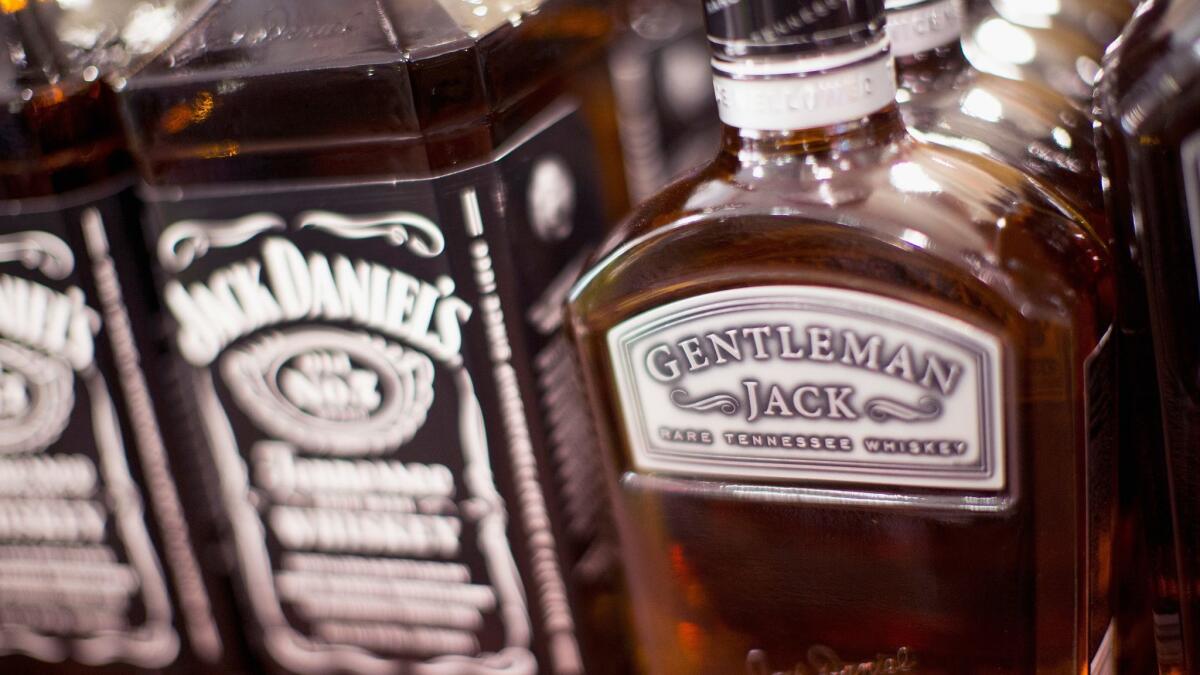Tariffs make U.S. bourbon an endangered species in European bars

- Share via
Small U.S. bourbon producers are finding that European drinkers love their products. It’s those tariffs that don’t go down so smoothly.
Following the European Union’s June implementation of a 25% tariff on bourbon, the popular U.S. whiskey variety, the impact has been clear. One American producer said his exports have “dropped to zero” as a result. Last year, they made up 15% of revenue.
“Every U.K. buyer backed off,” said Paul Hletko, the owner of Few Spirits of Evanston, Ill. “They may want to buy it, but if they can’t sell it at the right price, that’s not doing us any favors.”
Small distillers cite the drought as proof their fears of a global trade war are coming to fruition. Europe had been blossoming as a source of new revenue — but this market has been effectively cut off for producers that lack the clout or brand recognition of titans like Brown-Forman Corp. and Diageo PLC. Now they’ve been sent back to square one.
The tariffs, which target U.S. goods such as Levi Strauss & Co. blue jeans and Harley-Davidson Inc. motorcycles, are the EU’s retaliation to President Trump’s duties on foreign steel and aluminum.
Hletko said the low six figures he’s made this year from international orders all were booked before the tariffs’ imposition. Meanwhile, Rob Cassell, the owner of Philadelphia-based New Liberty Distillery, said European buyers have dissolved.
“Everybody shops by price,” Cassell said. “If your product before was 25 euros ($28.51) a bottle and all of a sudden it’s 35, but nothing’s changed, that’s not the same great buy for you that it was before.”
Spiros Malandrakis, head of alcoholic drinks research at Euromonitor, said the tariffs have stunted the growth of bourbon in Western Europe. Consumers will likely go to new whiskeys from countries such as Canada or Sweden, or drink something else, while big players like Brown-Forman’s Jack Daniels will find ways to absorb the additional costs — a luxury that smaller, upstart companies don’t have.
“Taxation and trade issues do play a role in drinking habits,” Malandrakis said. “It will be the smaller craft manufacturers that will start taking the biggest hits.”
Brown-Forman, which got just over a quarter of its revenue from Europe in 2017, opted to absorb the tariff’s impact in the short term before implementing delayed price increases. While the Louisville, Ky., company has this option, it’s still feeling pain from the tariffs, and in August it lowered its profit forecast for the fiscal year.
At Milroy’s, a whiskey shop in central London’s Soho district, American whiskey brands make up 25% of the bar’s 200-plus spirits. Over the last three to five years, customers bought them more than ever before, according to managing director Martyn “Simo” Simpson.
Prices for a third of U.S. brands have jumped 10% to 15%, and he may even stop selling some by springtime, he said.
“The whiskey drinkers aren’t going to stop drinking whiskey, they’ll just go on to something else,” Simpson said. “Scotland’s going to be loving it.”
More to Read
Inside the business of entertainment
The Wide Shot brings you news, analysis and insights on everything from streaming wars to production — and what it all means for the future.
You may occasionally receive promotional content from the Los Angeles Times.










